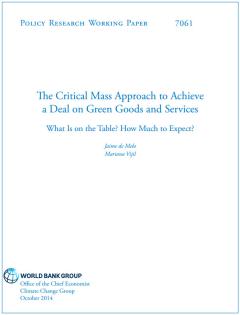
At the Davos forum of January 2014, a group of 14 countries pledged to launch negotiations on liberalizing trade in "green goods" (also known as "environmental" goods), focusing on the elimination of tariffs for an Asia-Pacific Economic Cooperation list of 54 products. The paper shows that the Davos group, with an average tariff of 1.8 percent, has little to offer as countries have avoided submitting products with tariff peaks for tariff reductions. Even if the list were extended to the 411 products on the World Trade Organization list, taking into account tariff dispersion, the tariff structure on environmental goods would be equivalent to a uniform tariff of 3.4 percent, about half the uniform tariff-equivalent for non-environmental goods. Enlarging the number of participants to low-income countries might be possible as, on average, their imports would not increase by more than 8 percent. However, because of the strong complementarities between trade in environmental goods and trade in environmental services, these should also be brought to the negotiation table, although difficulties in reaching agreement on their scope are likely to be great.
